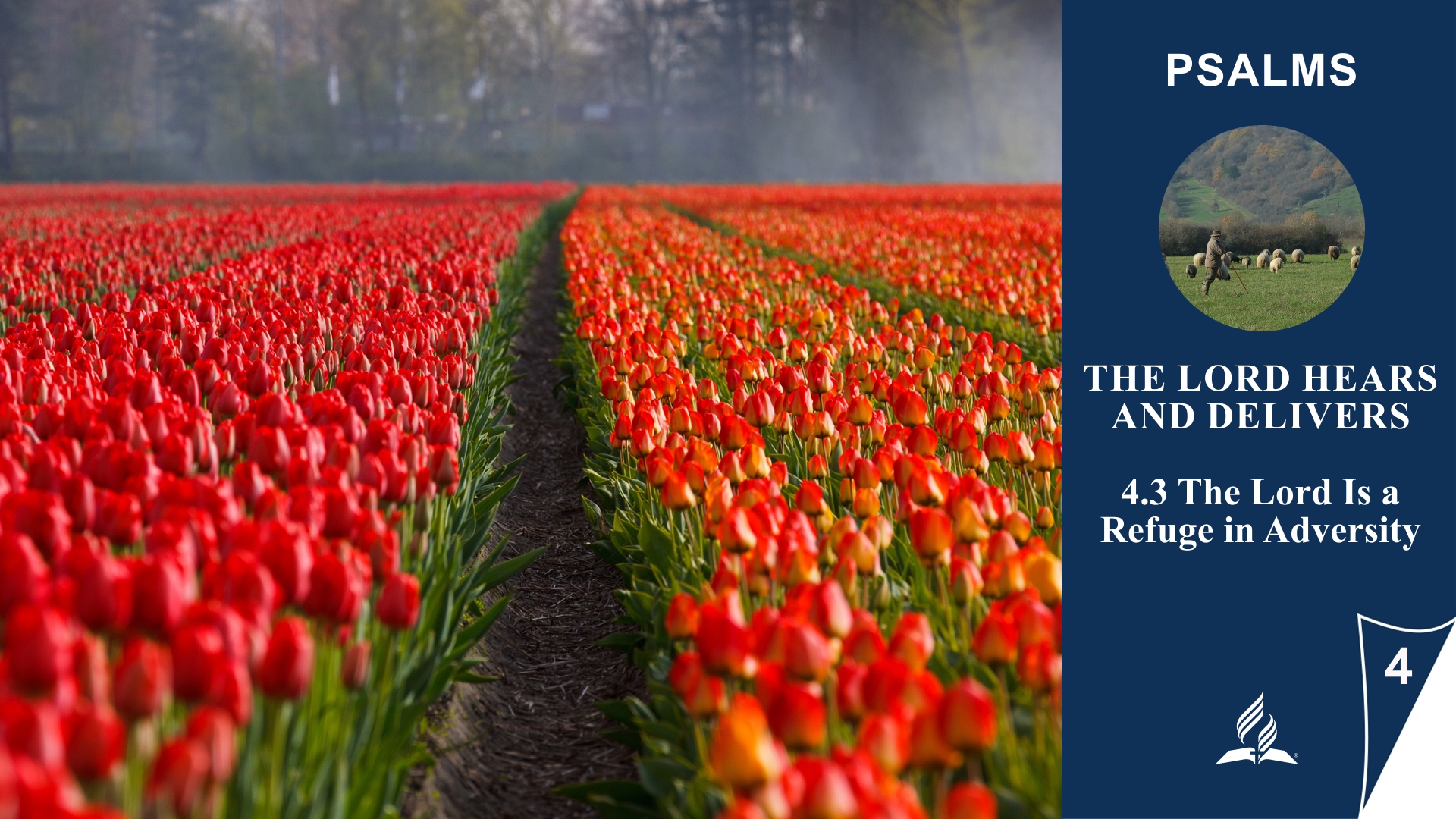

4.3 The Lord Is a Refuge in Adversity
Read Psalm 17:7–9; 31:2–4; and 91:2–7. What does the psalmist do in difficult times?
The Psalms 17:7–9; 31:2–4; and 91:2–7 illustrate the psalmist’s response to difficult times and his conscious decision to seek refuge in God. Here are some thoughts on these passages:
Psalm 17:7–9: The psalmist prays to God, asking Him to listen to his prayer. He trusts that God is just and attentive to his plea. In the midst of difficulties, the psalmist turns to God as his only refuge.
Psalm 31:2–4: The psalmist asks God to stand by his side and be his rock of refuge. He calls out to God, who is his strength, capable of delivering him from the snares of the enemy. The psalmist places his trust in God and acknowledges the power of the Almighty in challenging times.
Psalm 91:2–7: The psalmist confesses his trust in God as a refuge. He uses imagery such as “shield,” “shadow,” “refuge,” “fortress,” “wings,” “faithfulness,” “shield,” and “buckler” to describe God’s protective and secure nature. The psalmist recalls God’s faithfulness in the past, deriving assurance that God will be a secure refuge in the future.
In difficult times, the psalmist does the following:
-
Prayer and Communication with God: Actively turning to God, speaking to Him, and presenting concerns before Him.
-
Emphasis on Trust: Emphasizing trust in God as a refuge and recognizing God’s power and faithfulness in difficult times.
-
Remembrance of God’s Deeds: Recalling God’s actions in the past as a foundation for trust in the future.
The Psalms demonstrate that in challenging times, relying on God and consciously acknowledging Him as a refuge play a central role. This trust is built on the experience of a personal relationship with a powerful and loving God.
Read Psalm 17:8 and Matthew 23:37. What image is used, and what does it convey?
Psalm 17:8: 8 Keep me as the apple of your eye; hide me in the shadow of your wings.
Matthew 23:37: 37 “Jerusalem, Jerusalem, the city that kills the prophets and stones those who are sent to it! How often would I have gathered your children together as a hen gathers her brood under her wings, and you were not willing!”
In Psalm 17:8, the image used is “under the shadow of your wings.” This metaphor conveys the idea of comfort, security, and protection. It draws a parallel between God’s protection and the image of a bird mother hiding her chicks under her wings.
In Matthew 23:37, Jesus uses the same imagery when speaking about Jerusalem. He compares Himself to a hen who desires to gather and protect her chicks under her wings. This image expresses Jesus’ love, care, and desire to shield and guard the people of Jerusalem.
Both uses of this metaphor emphasize the loving and protective character of God and Jesus. In nature, wings are often a symbol of shelter and safety. The idea of finding refuge under the wings of God or Jesus conveys a strong sense of security and love. It suggests that God’s protection is not merely theoretical but is actively and empathetically provided, similar to a mother caring for her offspring.
However, how do we deal with times when misfortune strikes, and we seemingly cannot recognize God’s protection? Why do these experiences not mean that God is not with us?
Experiencing misfortune, pain, or seemingly lacking recognition of divine protection is a deeply human experience. In such moments, questions may arise about why God doesn’t intervene or why His protection isn’t clearly discerned. Here are some considerations:
-
God’s Ways Are Higher:
-
The Bible teaches that God’s thoughts and actions often surpass our understanding (Isaiah 55:8–9). In times of misfortune, we may not have the full perspective on God’s plan.
-
-
Reality of a Broken World:
-
In the world we live in, there is suffering and injustice. This doesn’t mean God is absent but reflects the reality of a world marked by sin and brokenness (1 John 5:19).
-
-
Trials and Growth:
-
The Bible speaks of trials and challenging times that shape and strengthen us (James 1:2–4). In these moments, we might not immediately recognize God’s protection, but it could be an opportunity for deepening our faith.
-
-
God’s Presence Despite Feelings:
-
Our feelings are not always the most reliable indicator of God’s presence. Even if we can’t feel or recognize His protection, it doesn’t necessarily mean God isn’t there. God promises never to leave us (Hebrews 13:5).
-
-
God Acts Through Human Instruments:
-
Sometimes, God’s protection may come in the form of help and support from other people. In difficult times, we should be open to the possibility that God’s work is happening through others.
-
-
Faith Amidst Doubt:
-
Faith doesn’t always mean having all the answers. At times, we must move forward in trust, even when we don’t fully understand.
-
-
Eternal Perspective:
-
The Bible encourages us to adopt an eternal perspective (2 Corinthians 4:16–18). What we experience here is temporary, but God’s faithfulness and protection are eternal.
-
It’s crucial to emphasize that experiencing difficulties doesn’t necessarily mean that God has abandoned us. On the contrary, amid challenges, we can develop a deeper reliance on God and experience His faithfulness in new ways.
(Visited 19 times, 1 visits today)




















